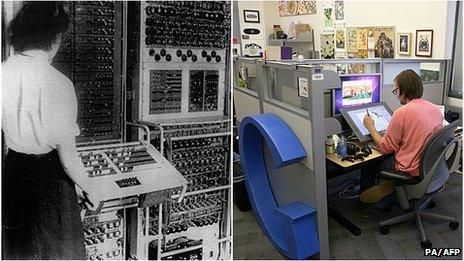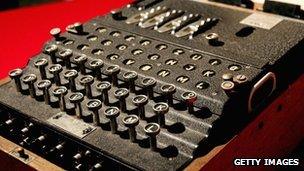Why is Google in love with Bletchley Park?
- Published
- comments

The wartime discoveries at Bletchley Park (L) laid the foundations for today's Google (R)
Technology giant Google normally has its eyes fixed firmly on the future. But it has turned its attention to an old house in England to help preserve a slice of computing history.
For nearly half a century after World War II, a Victorian manor house in Buckinghamshire lay neglected and unloved, its dilapidated buildings falling into disrepair.
By the early 90s, plans even emerged to tear down the assorted boarded-up huts around the house and erect a supermarket in their place.
For reasons of national security, a veil of secrecy shrouded Bletchley Park. Only in the last 20 years has the extraordinary story of breaking the code of the German Enigma machine finally become well-known.
The secret work there had, it is believed, shortened the war by two years.
But the veil of secrecy came at a cost, not just to the physical fabric of the site, but also, some believe, to Britain and its ability to build on its achievements in computer technology.
The Bletchley Park site, in Milton Keynes, is - at least superficially - a world away from Google's headquarters in Mountain View, California, known as the Googleplex.
But a desire, driven by a few individuals, to nurture the past has led to one of the world's top technology firms taking an unusually close interest in Bletchley Park and its legacy.
Google has provided cash for the purchase of key papers and is backing the current appeal to restore the derelict Block C at Bletchley Park.
The story began a year ago when a tweet caught British-born Google cloud computing executive Simon Meacham's eye in northern California. The tweet about papers from Alan Turing - the maths genius who was key to much of the wartime codebreaking work - came from Sue Black, a London-based computing expert and longstanding campaigner for Bletchley Park.
The papers - which included work from 1936 on "computable numbers" - were up for sale and therefore in danger of being lost to Bletchley. Turing had described an automatic machine which would be able to read and manipulate symbols on a tape through algorithms.
These concepts would be put into practice in the war when the first electronic programmable computer was built at Bletchley in order to crack codes.
While codebreaking was an important application of Turing's work, what he conceived has gone on to change the world.
The work of Turing and others was a central foundation for all computing technology including the algorithms that underpin Google's internet search engine and the page-ranking technology.
"I don't think it is an exaggeration to say that without Alan Turing, Google in the form we know it would not exist," says Peter Barron, head of external relations for Google in Europe, the Middle East and Africa.
After learning of the papers, Meacham approached Google.org, the company's charitable arm and some of its vice-presidents. "I reached out across Google and I said I need $100,000 [£63,000] by Monday, please," he recalls.
Many of those working at the company were already well informed about Turing and Bletchley, and Meacham had raised his $100,000 by the end of the weekend.
The papers were eventually purchased using money raised by journalist Gareth Halfacree, who has been campaigning for some time, Google, the National Heritage Memorial Fund, and private donors.
The relationship that began over the papers has now deepened. Google allows staff to spend up to 20% of their time on projects that interest them but which are not formally part of their jobs.
Meacham has used his to continue working on Bletchley Park. Google is now heavily involved with the fundraising for renovation of Block C where intelligence was catalogued - a task which will cost around £2m.
The drive started with a garden party attended by, among others, Lorna Rooke, a YouTube employee, and her grandmother Jean Valentine who had worked at Bletchley during the war.
Although parts of Bletchley have now been preserved, many of the huts are boarded up, the rooms inside dusty and empty.
The secrecy of the war was central to Bletchley's success but also undermined its legacy. One of the reasons Turing's papers were so valuable is that many of the records of Bletchley were deliberately destroyed after the war.
The decision was made to maintain secrecy so other codes could continue to be broken using the technology and techniques. Turing's own story also did not end happily. He killed himself after being convicted of having a sexual relationship with another man and forced to undergo a form of hormone treatment.
The work of others like the engineer Tommy Flowers, who helped build the first programmable computer at Bletchley, named Colossus, was also left unacknowledged.
Colossus itself was smashed into pieces on the orders of Churchill. The fact that the first electronic programmable computer had been built in Britain was hushed up.
The veil of secrecy that was cast over Bletchley led not just to the decay of the site but also meant an opportunity was lost for Britain's computer industry, Meacham believes.

An Enigma coding machine on display at Bletchley Park
He had grown up in England as the era of the personal computer revolution was just picking up pace. But he had found that to be at the cutting edge of new developments, he had to move to the US, commuting from the UK to work at Microsoft during his university holidays.
"There was no Silicon Valley in England," he explains. "It didn't flower into what you could imagine could have been a whole ecosystem around Bletchley with a science park. I had to go elsewhere as it wasn't there."
Meacham and others at the company emphasise that Google is not trying to muscle in on Bletchley's legacy; instead, they want to see an industry-wide effort to support it because of its special place in computing history.
Bletchley offers a chance to build something broad, argues Meacham.
"Wouldn't it be great if there was a hub for computing activity in the UK that was built around where the entire industry started?"
The future is now looking rosier for Bletchley Park. In October, the Heritage Lottery Fund announced that it would receive a £4.6m grant. The Queen also visited earlier in the year to open a memorial to those who had served there.
The hope for Meacham and others is that Bletchley might prove an inspiration for a new generation of computer enthusiasts placing it once again at the cutting edge of computer technology, restoring a legacy that, like the site itself, was nearly lost.